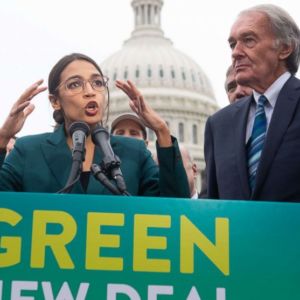Despite weeks of high-profile hype, the much-maligned Green New Deal failed to receive the support of a single Senator in its first test vote in the U.S. Senate. On Tuesday, not a single Democrat voted for the resolution, which called for the U.S. to achieve a zero-carbon economy within 10 years. To the relief of business groups, manufacturers, and the oil and gas industry, the measure failed by a vote of 0-57. Forty three Democrats voted present.
The vote was a setback for a resolution co-authored by freshman Rep. Alexandria Ocasio-Cortez (D, N.Y.) who first made headlines when she unseated a twenty-year Democratic incumbent to become the youngest women ever elected to the House. Introduced by Massachusetts Sen. Edward Markey (D), the Senate’s bill mirrored a proposal that she had introduced in the House. And even Markey, who introduced the bill in the Senate, declined to vote for it.
Three Democratic senators–Joe Manchin of West Virginia, Doug Jones of Alabama, and Kyrsten Sinema of Arizona–voted against the measure, as did Angus King of Maine, an independent who caucuses with the Democrats. Manchin and Jones did not comment on their votes, though Sinema released a statement affirming the need to address a changing climate with “realistic, achievable solutions,” and condemning political gamesmanship.
For the oil and gas industry, the vote was reassuring. Passage of the Green New Deal would gut the industry, likely at the cost of thousands of jobs.
“There have been no changes made to the Green New Deal, which means it is just as radical as when it was introduced. A government-mandated shift away from oil and gas would cause higher energy prices, slash education funding in Texas and put millions of hardworking Texans out of a job,” said Steve Everley, a spokesman for Texans for Natural Gas. Everley went on to describe the plan as so “divorced from reality” that not even Democrats would vote for it.
Meanwhile, the National Association of Manufacturers reiterated its members’ commitment to combating climate change and reducing emissions while attacked the proposal itself.
“Manufacturers agree with many of the individual goals of S.J. Res. 8, such as investing in energy and water efficiency, upgrading the power grid, expanding fuel diversity, repairing infrastructure and reducing GHG emissions,” wrote NAM Senior Vice President of Policy and Government Relations Aric Newhouse. “However, [the Green New Deal] is impractical in both its scope and its timeline. Manufacturers agree that more action is needed on climate; S.J. Res. 8, however, is the wrong answer.”
Some in the business community see the legislation less as a policy proposal and more as political appeasement to the Democratic Party’s activist base.
“Not a single Senator voted for the Green Raw Deal, maybe because of its $93 trillion price tag,” said Alfredo Ortiz, president and CEO of the Job Creators Network, a pro-business advocacy group. “Nearly every Senate Democrat voted present because they know it’s a disaster but they’re afraid of their base.”
For their part, Democrats are using the vote to attack Republicans for playing politics.
“Congress should stop the political games and work together on practical solutions that foster a healthy environment, grow our economy, and help Arizona families get ahead,” said Sinema. Sen. Markey, whose resolution was brought to the floor as written, called the vote on his own bill “a sham.”
“I encouraged them to vote present, along w/ others. McConnell tried to rush the #GreenNewDeal straight to the floor without a hearing,” Ocasio-Cortez via Twitter. “The real question we should be asking: Why does the Senate GOP refuse to hold any major hearings on climate change?”
The Green New Deal has lost its first vote, but supporters say that the fight is not over yet. Markey told environmentalists at the Capitol that the vote was only the start of a national debate on the proposal.

